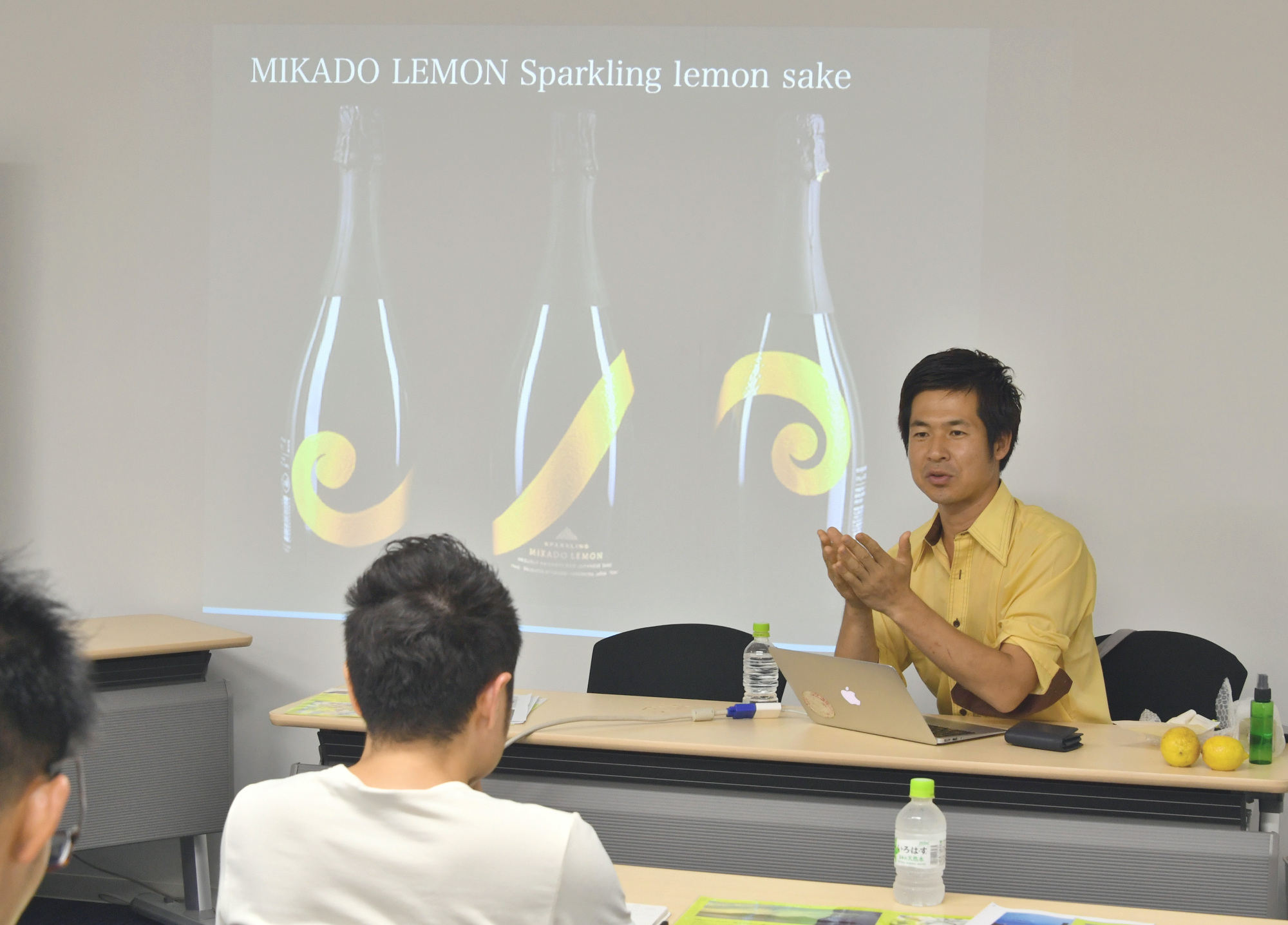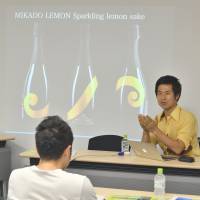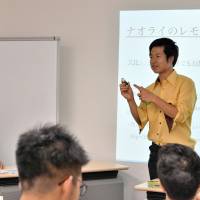Mikado Lemon, a sparkling lemon sake, is the first product of Naorai Inc. on Mikado Island in Kure, Hiroshima Prefecture. Founder and CEO Koichiro Miyake spoke about his sake, organic lemon orchard and the future of sake at the sixth Satoyama Cafe on July 30 in Tokyo.
The talk was organized by the Japan Times Satoyama Consortium, which helps relevant parties' efforts for effective utilization of satoyama communal woodland in rural regions.
Miyake grew up surrounded by sake culture as his family runs sake breweries in Kure and several other locations in western Japan. He established his own firm in 2015 to pursue his philosophy of sake production that features regional characteristics.
"Hiroshima is Japan's top producer of lemons, with about 700 lemon orchards in the prefecture," Miyake said. That is already a noteworthy regional characteristic, but he went one step further to maximize the value by narrowing the category of lemons down to organic ones.
"There are probably around 50 lemon orchards that grow lemons organically," he said. It was easier for him to start his own lemon orchard than to find an already existing organic lemon producer who shares his views.
Miyake began looking for steep hills with southern exposure, a suitable environment for growing lemons. He then came across Mikado Island in the Seto Inland Sea, which separates Honshu and Shikoku, where he started the Mikado Island Organic Lemon Garden.
Mikado Lemon is a fusion of the fresh organic lemon juice from Miyake's orchard and the top-quality sake made by his family's sake brewery in Kure.
No herbicides are used in the garden. Even the weeds that have been dug up are used as a natural fertilizer. "It is Naorai's policy to produce ingredients without exploiting anything or anyone," Miyake said. "Organic farming produces a richer environment that microorganisms such as soil bacteria live in."
Naorai started with 100 lemon trees in 2015, the year of the company's founding. Now they have 270. "We are planting a new tree for every 30 bottles of Mikado Lemon we sell," he said.
However, one of his major targets is to become the largest producer of organic lemons in Japan with 10,000 lemon trees by 2025. "Making a successful model with the 270 trees we have now would help attract more people to join us in lemon farming," he said.
He also offers opportunities for people to stay at the orchard to cover the labor shortage and encourage tourism in the region at the same time. "On the island, elderly people account for 75 percent of the population and 40 percent of the houses are vacant. A vacant house implies the existence of about two abandoned farms that once belonged to the family who owned the house," Miyake noted.
The empty houses are now used as accommodation for people visiting the lemon orchard. Visitors can gain hands-on experience in lemon growing during their stay.
In addition, the crowd-funding campaign they launched as a strategic way to gain publicity and funding at the same time collected ¥8.94 million from those who wanted to support Naorai's organic lemon farming in just five days.
To make the organic lemon business financially sustainable, he also looks to increase the harvest yields and the price per kilogram. Creating additional value from everything the lemons have to offer is the key.
No part of the lemons is wasted, as Naorai has made essential oils and powder from the rinds that can be further processed in many different ways to create new merchandise such as cosmetic products. "The pith goes into compost, and we are now developing a natural yeast using lemon flowers," Miyake said.
The number of sake breweries in Japan has decreased over the years. Miyake said that currently, there are about 1,200 sake breweries in Japan. This is one-third of the number four decades ago.
"Thirteen major sake manufacturers account for 50 percent of the total sake production in Japan. Small-sized sake makers face a harsh battle for survival," he said.
Naorai's goal is not just to sell more Mikado Lemon, but to contribute to the entire sake brewing industry by using the knowledge and ideas gained to revitalize other small sake producers. Miyake concluded his presentation at the Satoyama Cafe by saying that Naorai aims to preserve the diversity of sake breweries.
This series introduces municipalities and local companies promoting the beauty and excellence of deep Japan.




















With your current subscription plan you can comment on stories. However, before writing your first comment, please create a display name in the Profile section of your subscriber account page.